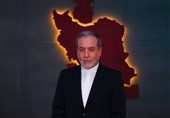Leader’s Letter Addresses Westerners’ Misconceptions about Islam: US Analyst
TEHRAN (Tasnim) – An American political analyst said the second letter penned by Supreme Leader of the Islamic Revolution Ayatollah Seyed Ali Khamenei to Western youth aims to inform the younger generation of Westerners’ misconceptions about Islam and Muslims.
“The letter addresses many misconceptions that Westerners, particularly Americans, have about Islam, and its history, culture, and traditions. The letter also addresses many misunderstandings concerning Islamic nations that are commonly held in the West,” Keith Preston, the chief editor and director of attackthesystem.com, told Tasnim.
Following is the full text of the interview.
Q: Leader of the Islamic Revolution Ayatollah Seyed Ali Khamenei has penned a new letter to the young people of the West. What's your perspective on the message?
A: The letter expresses very well the criticisms that many in the Muslim world have of the Western powers. Ayatollah Khamenei is attempting to convey these criticisms to Western young people whom I believe he hopes will be a force for political change as they grown older and become the dominant generation. The letter addresses many misconceptions that Westerners, particularly Americans, have about Islam, and its history, culture, and traditions. The letter also addresses many misunderstandings concerning Islamic nations that are commonly held in the West. Ayatollah Khamenei is attempting to explain to Western young people that the terrorist actions carried out in Paris are not representative of Islam as a whole, or approved by authentic Islamic teaching, just as no Westerner holding to an honest or reasonable interpretation of Christianity would advocate such actions. The letter points out that the Daesh represents a deviant heresy from Islam, and that the extremism of the Daesh is actually supported by the [Persian] Gulf states that are allies of the West. The letter also acknowledges efforts by the Western powers to cultivate extremists of these kinds as weapons against Middle Eastern nations to whom the Western powers are opposed. Another important aspect of the letter is that it points out that the terrorism that the West has experienced in recent years pales in comparison to what people in Islamic countries such as Iraq, Syria, Palestine, Libya, Lebanon, and elsewhere have experienced on a much more massive scale, and that persistent Western intervention in the Middle East is a principal contributing factor to this.
Q: The Leader penned his first letter to the younger generation in the West after gunmen attacked offices of French magazine, Charlie Hebdo, and killed scores of people after it published sacrilegious cartoon of Islam's Holy Prophet Mohammad (PBUH) in its January 14 edition. The Leader’s second letter also came in light of the recent terrorist attacks in Paris. Why did the leader choose to directly address the Western youth once again in form of a letter after another terrorist attack?
A: The first letter that was issued by Ayatollah Khamenei was primarily an effort to address the common perception of Muslims as merely being terrorists that many Westerners subscribe to. The first called upon Western youth to actually study Islam and its teachings, and develop an informed perception of Islam, rather than merely forming an opinion based on an incident such as the attack on the Charlie Hebdo offices. The purpose of the first letter was to challenge the perception of Islam in the West by addressing Western youth directly. The second letter offers a wider discussion of the political factors that shape the Islamic world today, particularly the impact of Western imperialism on Islamic nations, and the efforts by the Western powers to fuel extremism in the region as a means of destabilization. The second also calls for Western youth to put themselves in the place of people in Muslim countries who deal with this kind violence on a much larger level. Very few Westerners fully understand that hundreds of thousands of people in Muslim countries, perhaps millions, have been killed, injured, suffered the loss of family friends, dislocated or forced into exile by wars and terrorism that have been supported or carried out directly by the Western powers. The letter is not only criticizing the Western nations for these actions, but also criticizing the West for turning a blind eye to the support for extremism and terrorism that is being carried out by the reactionary [Persian] Gulf States, and the oppression of the Palestinians that is happening while the West looks the other way.
Q: In his letter, the Leader has stressed that “blind terrorism” was the main cause behind the Paris attacks. Why “blind terrorism”?
A: Ayatollah Khamenei is merely expressing the view that the attacks in Paris were senseless acts of random violence against innocent people, and that such acts not only do not represent authentic Islamic teaching, but also serve no constructive purpose at all. His letter raises the important question of why persons born and raised in Europe, as some of the terrorists involved in this incident were, would be attracted to the kinds of violent extremism represented by groups like the Daesh, al-Qaeda, al-Nusra Front, and others. The letter argues that the sense of injustice many Muslims, including Western Muslims, experience when they view the atrocities that are carried out by Western powers and Western-supported regimes in the Middle East against their fellow Muslims drives many of the young Western Muslims towards extremism of the kind that leads to incidents like those in Paris. The letter also expresses concern that efforts to stigmatize and marginalize Muslims in the Western world will only fuel feelings of alienation and resentment that will in turn have the effect of increasing the level of sympathy for extremist organizations. There is also the concern that outrage over terrorism and concerns about security will lead to state repression of innocent Muslims living in Western countries.






